formerly eScholarship Editions


|
|
|
|
Your request for similar items found 20 book(s). | Modify Search | Displaying 1 - 20 of 20 book(s) | |
| 1. | 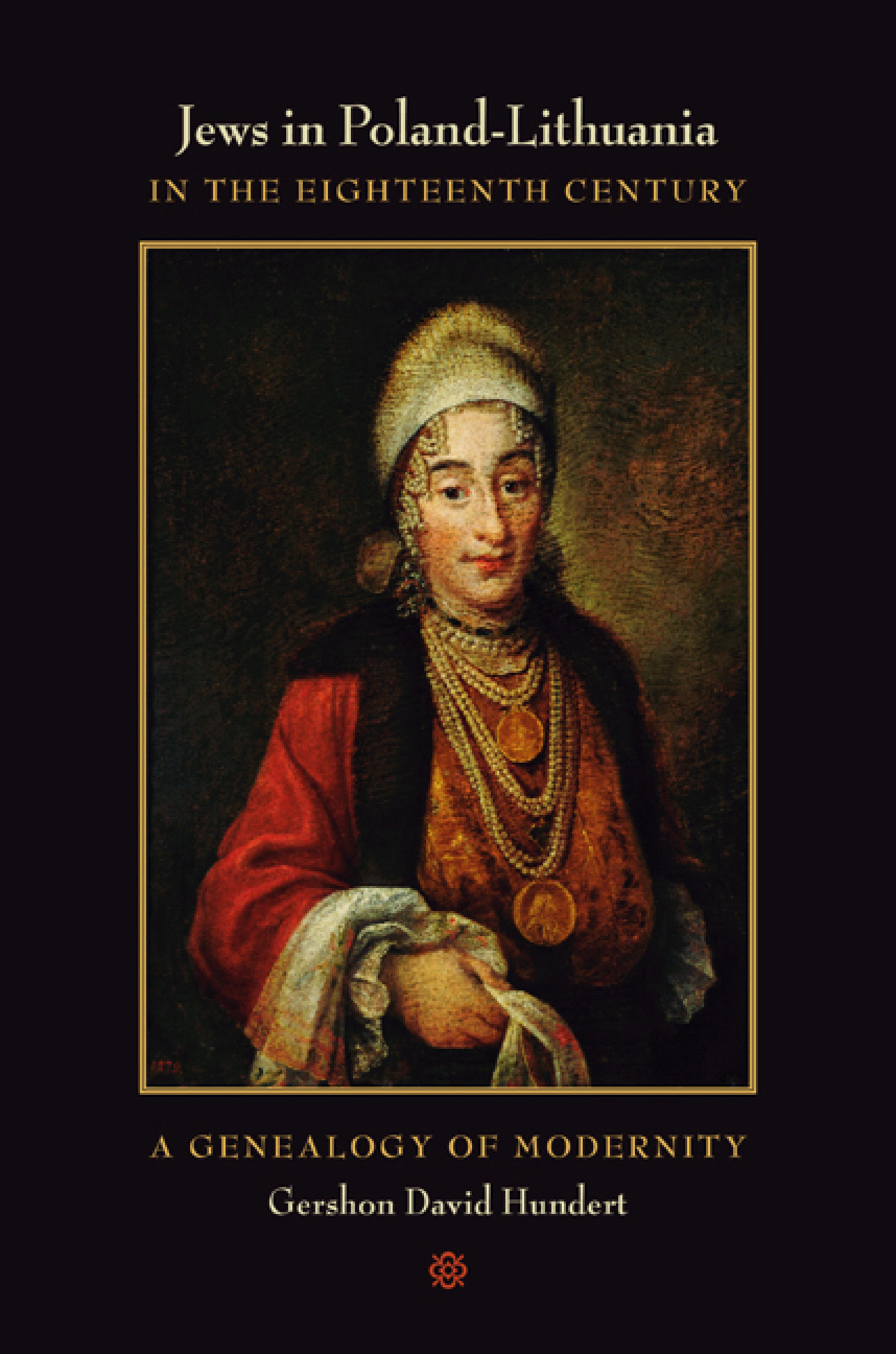 | Title: Jews in Poland-Lithuania in the eighteenth century: a genealogy of modernity Author: Hundert, Gershon David 1946- Published: University of California Press, 2004 Subjects: History | European History | Jewish Studies | Religion Publisher's Description: Missing from most accounts of the modern history of Jews in Europe is the experience of what was once the largest Jewish community in the world - an oversight that Gershon David Hundert corrects in this history of Eastern European Jews in the eighteenth century. The experience of eighteenth-century Jews in the Polish-Lithuanian Commonwealth did not fit the pattern of integration and universalization - in short, of westernization - that historians tend to place at the origins of Jewish modernity. Hundert puts this experience, that of the majority of the Jewish people, at the center of his history. He focuses on the relations of Jews with the state and their role in the economy, and on more "internal" developments such as the popularization of the Kabbalah and the rise of Hasidism. Thus he describes the elements of Jewish experience that became the basis for a "core Jewish identity" - an identity that accompanied the majority of Jews into modernity. [brief] Similar Items |
| 2. | 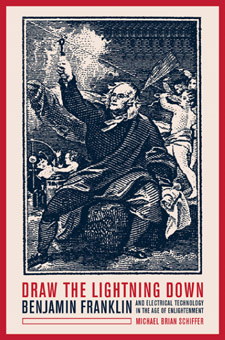 | Title: Draw the lightning down: Benjamin Franklin and electrical technology in the Age of Enlightenment Author: Schiffer, Michael B Published: University of California Press, 2003 Subjects: History | Urban Studies | History of Science | Anthropology | American Studies | European History Publisher's Description: Most of us know - at least we've heard - that Benjamin Franklin conducted some kind of electrical experiment with a kite. What few of us realize - and what this book makes powerfully clear - is that Franklin played a major role in laying the foundations of modern electrical science and technology. This fast-paced book, rich with historical details and anecdotes, brings to life Franklin, the large international network of scientists and inventors in which he played a key role, and their amazing inventions. We learn what these early electrical devices - from lights and motors to musical and medical instruments - looked like, how they worked, and what their utilitarian and symbolic meanings were for those who invented and used them. Against the fascinating panorama of life in the eighteenth century, Michael Brian Schiffer tells the story of the very beginnings of our modern electrical world. The earliest electrical technologies were conceived in the laboratory apparatus of physicists; because of their surprising and diverse effects, however, these technologies rapidly made their way into many other communities and activities. Schiffer conducts us from community to community, showing how these technologies worked as they were put to use in public lectures, revolutionary experiments in chemistry and biology, and medical therapy. This story brings to light the arcane and long-forgotten inventions that made way for many modern technologies - including lightning rods (Franklin's invention), cardiac stimulation, xerography, and the internal combustion engine - and richly conveys the complex relationships among science, technology, and culture. [brief] Similar Items |
| 3. | 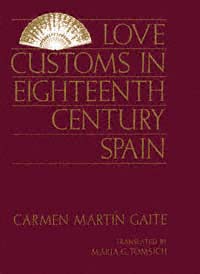 | Title: Love customs in eighteenth-century Spain Author: Martín Gaite, Carmen Published: University of California Press, 1991 Subjects: History | European History | Gender Studies Similar Items |
| 4. | 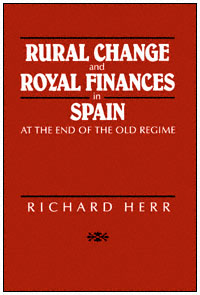 | Title: Rural change and royal finances in Spain at the end of the old regime Author: Herr, Richard Published: University of California Press, 1989 Subjects: History | European History Similar Items |
| 5. | 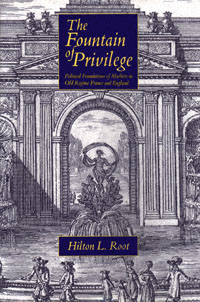 | Title: The fountain of privilege: political foundations of markets in Old Regime France and England Author: Root, Hilton L Published: University of California Press, 1994 Subjects: History | Politics | Economics and Business | European History | Sociology | French Studies Publisher's Description: Hilton Root's new book applies contemporary economic and political theory to answer long-standing historical questions about modernization. It contrasts political stability in Georgian England with the collapse of the Old Regime in France. Why did a century of economic expansion rupture France's political foundations while leaving those of Britain intact? Comparing the political and financial institutions of the two states, Root argues that the French monarchy's tight control of markets created unresolvable social conflicts whereas England's broader power base permitted the wider distribution of economic favors, resulting in more flexible and efficient markets. [brief] Similar Items |
| 6. | 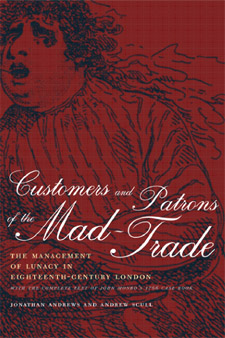 | Title: Customers and patrons of the mad-trade: the management of lunacy in eighteenth-century London: with the complete text of John Monro's 1766 case book Author: Andrews, Jonathan 1961- Published: University of California Press, 2003 Subjects: History | History of Science | Psychology | Social Problems | Psychiatry Publisher's Description: This book is a lively commentary on the eighteenth-century mad-business, its practitioners, its patients (or "customers"), and its patrons, viewed through the unique lens of the private case book kept by the most famous mad-doctor in Augustan England, Dr. John Monro (1715-1791). Monro's case book, comprising the doctor's jottings on patients he saw in the course of his private practice--patients drawn from a great variety of social strata--offers an extraordinary window into the subterranean world of the mad-trade in eighteenth-century London. The volume concludes with a complete edition of the case book itself, transcribed in full with editorial annotations by the authors. In the fragmented stories Monro's case book provides, Andrews and Scull find a poignant underworld of human psychological distress, some of it strange and some quite familiar. They place these "cases" in a real world where John Monro and othersuccessful doctors were practicing, not to say inventing, the diagnosis and treatment of madness. [brief] Similar Items |
| 7. | 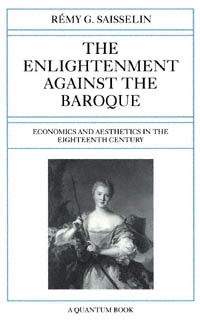 | Title: The Enlightenment against the Baroque: economics and aesthetics in the eighteenth century Author: Saisselin, Rémy G. (Rémy Gilbert) 1925- Published: University of California Press, 1992 Subjects: History | Economics and Business | Popular Culture | Art | Renaissance History Publisher's Description: How do seemingly disparate arenas of Enlightenment philosophy, economic theories, boudoir etiquette, literary styles, and artistic modes coincide in the late eighteenth century? In this poetic essay on the evolution of the idea of luxury and art, Rémy Saisselin uses precise, witty examples to describe the development of our modern taste, ultimately the successor of the more spiritual and grand baroque goût . His analysis both illuminates and distinguishes between eighteenth-century and modern varieties of conspicuous consumption.This persuasive discourse depicts the rise of luxe as an escape from ennui and shows how, for the first time in European history, a large class of wealthy, leisured people emerged to make art, luxury, and the avoidance of boredom its preoccupation. Saisselin provides an original and lucid picture of the first phases in the emergence of a specifically bourgeois taste. [brief] Similar Items |
| 8. | 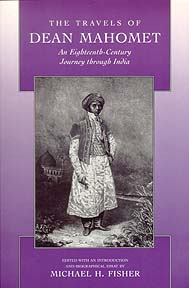 | Title: The travels of Dean Mahomet: an eighteenth-Century journey through India Author: Mahomet, Sake Deen 1759-1851 Published: University of California Press, 1997 Subjects: History | Asian History | South Asia | Travel | Autobiographies and Biographies Publisher's Description: This unusual study combines two books in one: the 1794 autobiographical travel narrative of an Indian, Dean Mahomet, recalling his years as camp-follower, servant, and subaltern officer in the East India Company's army (1769 to 1784); and Michael H. Fisher's portrayal of Mahomet's sojourn as an insider/outsider in India, Ireland, and England. Emigrating to Britain and living there for over half a century, Mahomet started what was probably the first Indian restaurant in England and then enjoyed a distinguished career as a practitioner of "oriental" medicine, i.e., therapeutic massage and herbal steam bath, in London and the seaside resort of Brighton. This is a fascinating account of life in late eighteenth-century India - the first book written in English by an Indian - framed by a mini-biography of a remarkably versatile entrepreneur. Travels presents an Indian's view of the British conquest of India and conveys the vital role taken by Indians in the colonial process, especially as they negotiated relations with Britons both in the colonial periphery and the imperial metropole.Connoisseurs of unusual travel narratives, historians of England, Ireland, and British India, as well as literary scholars of autobiography and colonial discourse will find much in this book. But it also offers an engaging biography of a resourceful, multidimensional individual. [brief] Similar Items |
| 9. | 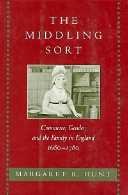 | Title: The middling sort: commerce, gender, and the family in England, 1680-1780 Author: Hunt, Margaret R 1953- Published: University of California Press, 1996 Subjects: History | Gender Studies | Social Science Publisher's Description: To be one of "the middling sort" in urban England in the late seventeenth or eighteenth century was to live a life tied, one way or another, to the world of commerce. In a lively study that combines narrative and alternately poignant and hilarious anecdotes with convincing analysis, Margaret R. Hunt offers a view of middling society during the hundred years that separated the Glorious Revolution from the factory age. Thanks to her exploration of many family papers and court records, Hunt is able to examine what people thought, felt, and valued. She finds that early capitalism and early modern family life were far more insecure than their "classical" models supposed.Commercial needs and social needs coincided to a large extent. The family is central to Hunt's story, and she shows how financial struggles brought conflict, ambiguity, and tension to the home. She investigates the way gender intertwined with class and family hierarchy and the way many businesses survived as precarious successes, secured through the sacrifices made by female as well as male family members. The Middling Sort offers a dynamic portrait of a society struggling to minimize the considerable social and psychic dislocation that accompanied England's launch of a full-scale market economy. [brief] Similar Items |
| 10. | 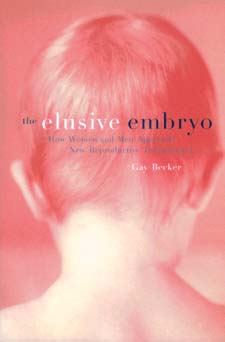 | Title: The elusive embryo: how women and men approach new reproductive technologies Author: Becker, Gaylene Published: University of California Press, 2000 Subjects: Anthropology | Cultural Anthropology | Sociology | Gender Studies | Medical Anthropology | Medicine | Women's Studies | Science Publisher's Description: In the first book to examine the industry of reproductive technology from the perspective of the consumer, Gay Becker scrutinizes the staggering array of medical options available to women and men with fertility problems and assesses the toll - both financial and emotional - that the quest for a biological child often exacts from would-be parents. Becker interviewed hundreds of people over a period of years; their stories are presented here in their own words. Absorbing, informative, and in many cases moving, these stories address deep-seated notions about gender, self-worth, and the cultural ideal of biological parenthood. Becker moves beyond people's personal experiences to examine contemporary meanings of technology and the role of consumption in modern life. What emerges is a clear view of technology as culture, with technology the template on which issues such as gender, nature, and the body are being rewritten and continuously altered. The Elusive Embryo chronicles the history and development of reproductive technology, and shows how global forces in consumer culture have contributed to the industry's growth. Becker examines how increasing use of reproductive technology has changed ideas about "natural" pregnancy and birth. Discussing topics such as in vitro fertilization, how men and women "naturalize" the use of a donor, and what happens when new reproductive technologies don't work, Becker shows how the experience of infertility has become increasingly politicized as potential parents confront the powerful forces that shape this industry. The Elusive Embryo is accessible, well written, and well documented. It will be an invaluable resource for people using or considering new reproductive technologies as well as for social scientists and health professionals. [brief] Similar Items |
| 11. | 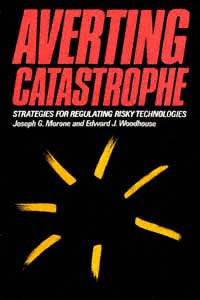 | Title: Averting catastrophe: strategies for regulating risky technologies Author: Morone, Joseph G Published: University of California Press, 1988 Subjects: Environmental Studies | History and Philosophy of Science | Politics Publisher's Description: Chernobyl, Bhopal, and Love Canal are symbols of the potentially catastrophic risks that go hand in hand with much modern technology. This volume is a non-partisan study of the imperfect but steadily developing system for containing the risks of such technologies as chemicals, nuclear power, and gen . . . [more] Similar Items |
| 12. | 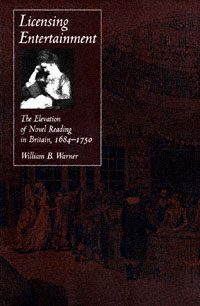 | Title: Licensing entertainment: the elevation of novel reading in Britain, 1684-1750 Author: Warner, William Beatty Published: University of California Press, 1998 Subjects: Literature | European History | Print Media | English Literature Publisher's Description: Novels have been a respectable component of culture for so long that it is difficult for twentieth-century observers to grasp the unease produced by novel reading in the eighteenth century. William Warner shows how the earliest novels in Britain, published in small-format print media, provoked early instances of the modern anxiety about the effects of new media on consumers.Warner uncovers a buried and neglected history of the way in which the idea of the novel was shaped in response to a newly vigorous market in popular narratives. In order to rein in the sexy and egotistical novel of amorous intrigue, novelists and critics redefined the novel as morally respectable, largely masculine in authorship, national in character, realistic in its claims, and finally, literary. Warner considers early novelists in their role as entertainers and media workers, and shows how the short, erotic, plot-driven novels written by Behn, Manley, and Haywood came to be absorbed and overwritten by the popular novels of Defoe, Richardson, and Fielding. Considering these novels as entertainment as well as literature, Warner traces a different story - one that redefines the terms within which the British novel is to be understood and replaces the literary history of the rise of the novel with a more inclusive cultural history. [brief] Similar Items |
| 13. | 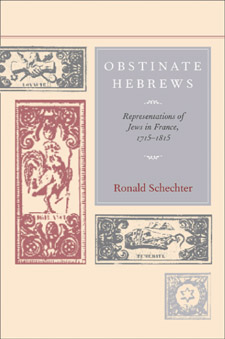 | Title: Obstinate Hebrews: representations of Jews in France, 1715-1815 Author: Schechter, Ronald Published: University of California Press, 2003 Subjects: History | European History | Jewish Studies | Intellectual History | French Studies Publisher's Description: Enlightenment writers, revolutionaries, and even Napoleon discussed and wrote about France's tiny Jewish population at great length. Why was there so much thinking about Jews when they were a minority of less than one percent and had little economic and virtually no political power? In this unusually wide-ranging study of representations of Jews in eighteenth-century France - both by Gentiles and Jews themselves - Ronald Schechteroffers fresh perspectives on the Enlightenment and French Revolution, on Jewish history, and on the nature of racism and intolerance. Informed by the latest historical scholarship and by the insights of cultural theory, Obstinate Hebrews is a fascinating tale of cultural appropriation cast in the light of modern society's preoccupation with the "other." Schechter argues that the French paid attention to the Jews because thinking about the Jews helped them reflect on general issues of the day. These included the role of tradition in religion, the perfectibility of human nature, national identity, and the nature of citizenship. In a conclusion comparing and contrasting the "Jewish question" in France with discourses about women, blacks, and Native Americans, Schechter provocatively widens his inquiry, calling for a more historically precise approach to these important questions of difference. [brief] Similar Items |
| 14. | 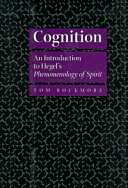 | Title: Cognition: an introduction to Hegel's Phenomenology of spirit Author: Rockmore, Tom 1942- Published: University of California Press, 1997 Subjects: Philosophy | Intellectual History Publisher's Description: Hegel's Phenomenology of Spirit , the philosopher's first and perhaps greatest work, is the most important philosophical treatise of the nineteenth century. In this companion volume to his general introduction to Hegel, Tom Rockmore offers a passage-by-passage guide to the Phenomenology for first-time readers of the book and others who are not Hegel specialists.Rockmore demonstrates that Hegel's concepts of spirit, consciousness, and reason can be treated as elements of a single, coherent theory of knowledge, one that remains strikingly relevant for the contemporary discussion. He shows how the various conceptions of cognition developed in the text culminate in absolute knowing, which Rockmore reads, in opposition to the frequent religious readings of Hegel, in a wholly secular manner. Unlike commentators who isolate Hegel's text from its philosophical origins, Rockmore analyzes the book in the philosophical context from which it emerged, lucidly discussing notoriously difficult passages in relation to the ideas of Aristotle and Descartes, and above all to those of Kant and other German idealists. [brief] Similar Items |
| 15. | 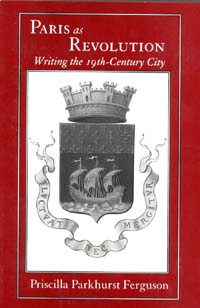 | Title: Paris as revolution: writing in the nineteenth-century city Author: Ferguson, Priscilla Parkhurst Published: University of California Press, 1997 Subjects: Literature | Social Theory | European Literature | Literary Theory and Criticism | European History | French Studies Publisher's Description: In nineteenth-century Paris, passionate involvement with revolution turned the city into an engrossing object of cultural speculation. For writers caught between an explosive past and a bewildering future, revolution offered a virtuoso metaphor by which the city could be known and a vital principle through which it could be portrayed.In this engaging book, Priscilla Ferguson locates the originality and modernity of nineteenth-century French literature in the intersection of the city with revolution. A cultural geography, Paris as Revolution "reads" the nineteenth-century city not in literary works alone but across a broad spectrum of urban icons and narratives. Ferguson moves easily between literary and cultural history and between semiotic and sociological analysis to underscore the movement and change that fueled the powerful narratives defining the century, the city, and their literature. In her understanding and reconstruction of the guidebooks of Mercier, Hugo, Vallès, and others, alongside the novels of Flaubert, Hugo, Vallès, and Zola, Ferguson reveals that these works are themselves revolutionary performances, ones that challenged the modernizing city even as they transcribed its emergence. [brief] Similar Items |
| 16. | 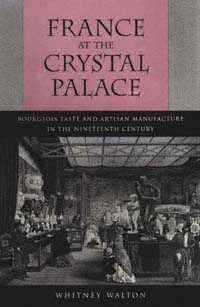 | Title: France at the Crystal Palace: bourgeois taste and artisan manufacture in the nineteenth century Author: Walton, Whitney Published: University of California Press, 1992 Subjects: History | European History | Women's Studies | French Studies Publisher's Description: Whitney Walton approaches the nineteenth-century French industrial development from a new perspective - that of consumption. She analyzes the French performance at the Crystal Palace Exhibition of 1851 to illustrate how bourgeois consumers influenced France's distinctive pattern of industrial development. She also demonstrates the importance of consumption and gender in class formation and reveals how women influenced industry in their role as consumers.Walton examines important consumer goods industries that have been rarely studied by historians, such as the manufacture of wallpaper, furniture, and bronze statues. Using archival sources on household possessions of the Parisian bourgeoisie as well as published works, she shows how consumers' taste for fashionable, artistic, well-made furnishings and apparel promoted a specialization unique to nineteenth-century France. [brief] Similar Items |
| 17. | 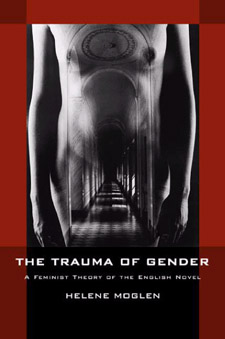 | Title: The trauma of gender: a feminist theory of the English novel Author: Moglen, Helene 1936- Published: University of California Press, 2001 Subjects: Literature | Gender Studies | Women's Studies | European Studies | European History | Literary Theory and Criticism | English Literature Publisher's Description: Helene Moglen offers a revisionary feminist argument about the origins, cultural function, and formal structure of the English novel. While most critics and historians have associated the novel's emergence and development with the burgeoning of capitalism and the rise of the middle classes, Moglen contends that the novel princi- pally came into being in order to manage the social and psychological strains of the modern sex-gender system. Rejecting the familiar claim that realism represents the novel's dominant tradition, she shows that, from its inception in the eighteenth century, the English novel has contained both realistic and fantastic narratives, which compete for primacy within individual texts. [brief] Similar Items |
| 18. | 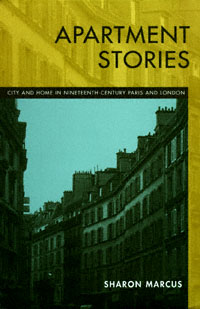 | Title: Apartment stories: city and home in nineteenth-century Paris and London Author: Marcus, Sharon 1966- Published: University of California Press, 1999 Subjects: Literature | European History | Urban Studies | Women's Studies Publisher's Description: In urban studies, the nineteenth century is the "age of great cities." In feminist studies, it is the era of the separate domestic sphere. But what of the city's homes? In the course of answering this question, Apartment Stories provides a singular and radically new framework for understanding the urban and the domestic. Turning to an element of the cityscape that is thoroughly familiar yet frequently overlooked, Sharon Marcus argues that the apartment house embodied the intersections of city and home, public and private, and masculine and feminine spheres.Moving deftly from novels to architectural treatises, legal debates, and popular urban observation, Marcus compares the representation of the apartment house in Paris and London. Along the way, she excavates the urban ghost tales that encoded Londoners' ambivalence about city dwellings; contends that Haussmannization enclosed Paris in a new regime of privacy; and locates a female counterpart to the flâneur and the omniscient realist narrator - the portière who supervised the apartment building. [brief] Similar Items |
| 19. | 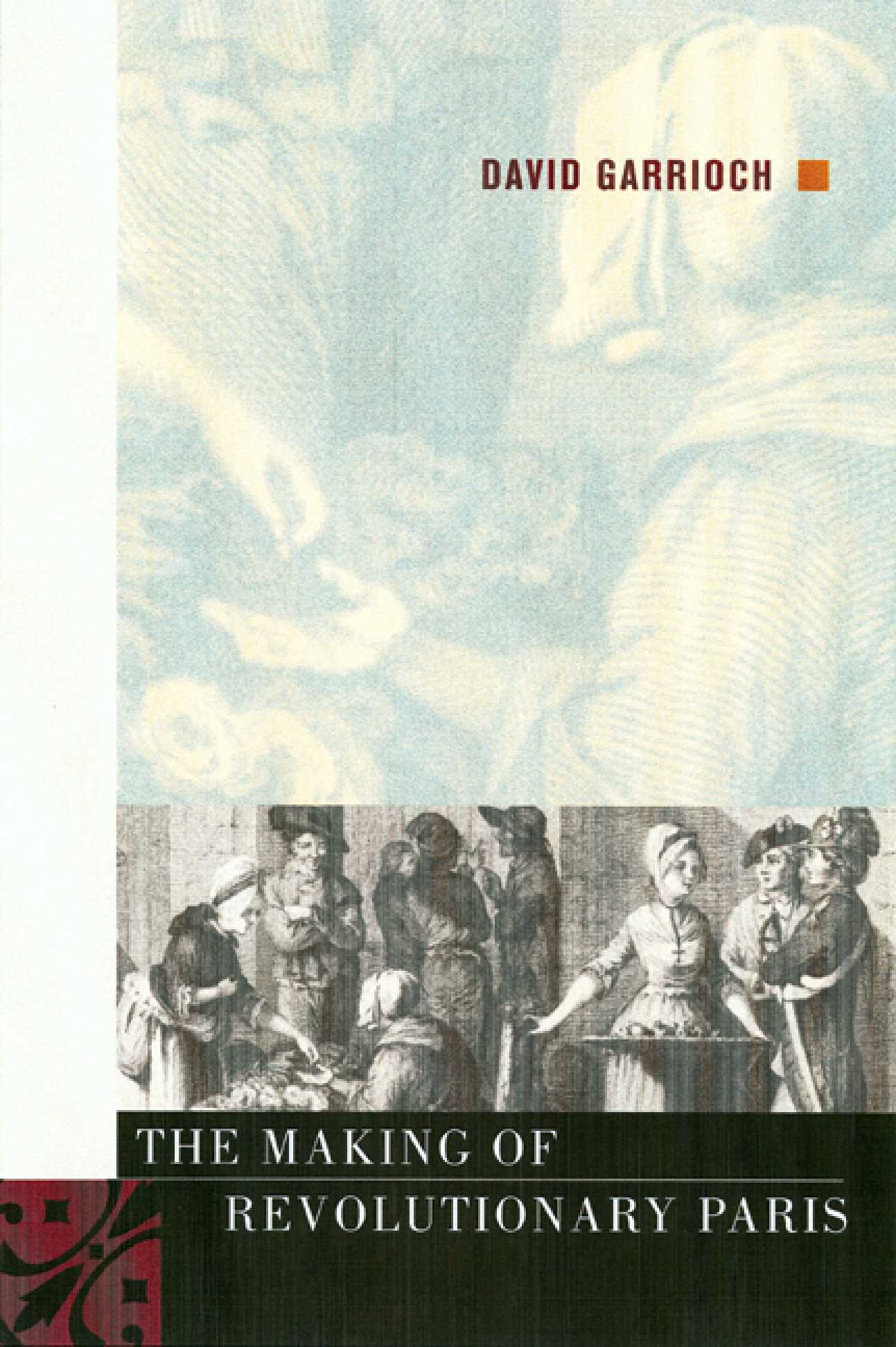 | Title: The making of revolutionary Paris Author: Garrioch, David Published: University of California Press, 2002 Subjects: History | European History | European Studies | French Studies Publisher's Description: The sights, sounds, and smells of life on the streets and in the houses of eighteenth-century Paris rise from the pages of this marvelously anecdotal chronicle of a perpetually alluring city during one hundred years of extraordinary social and cultural change. An excellent general history as well as an innovative synthesis of new research, The Making of Revolutionary Paris combines vivid portraits of individual lives, accounts of social trends, and analyses of significant events as it explores the evolution of Parisian society during the eighteenth century and reveals the city's pivotal role in shaping the French Revolution. David Garrioch rewrites the origins of the Parisian Revolution as the story of an urban metamorphosis stimulated by factors such as the spread of the Enlightenment, the growth of consumerism, and new ideas about urban space. With an eye on the broad social trends emerging during the century, he focuses his narrative on such humble but fascinating aspects of daily life as traffic congestion, a controversy over the renumbering of houses, and the ever-present dilemma of where to bury the dead. He describes changes in family life and women's social status, in religion, in the literary imagination, and in politics. Paris played a significant role in sparking the French Revolution, and in turn, the Revolution changed the city, not only its political structures but also its social organization, gender ideologies, and cultural practices. This book is the first to look comprehensively at the effect of the Revolution on city life. Based on the author's own research in Paris and on the most current scholarship, this absorbing book takes French history in new directions, providing a new understanding of the Parisian and the European past. [brief] Similar Items |
| 20. | 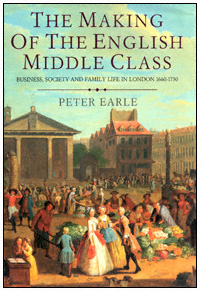 | Title: The making of the English middle class: business, society, and family life in London, 1660-1730 Author: Earle, Peter 1937- Published: University of California Press, 1989 Subjects: History Publisher's Description: This is the first major study of a neglected yet extremely significant subject: the London middle classes in the period between 1660 and 1730, a period in which they created a society and economy that can be seen with hindsight to have ushered in the modern world. Using a wealth of material from contemporary sources - including wills, business papers, inventories, marriage contracts, divorce hearings, and the writings of Daniel Defoe and Samuel Pepys - Peter Earle presents a fully rounded picture of the "middling sort of people," getting to the hearts of their lives as men and women struggling for success in the biggest, richest, and most middle-class city in contemporary Europe.He examines in fascinating and convincing detail the business life of Londoners, from apprenticeship through the problems and potential rewards of different occupational groups, going on to look at middle-class family, social, political and material life - from relationships with spouses, children, servants, and neighbors, to food and clothes and furniture, to sickness, death, and burial.Stimulating, scholarly, and constantly illuminating, this book is an important and impressive contribution to English social history. [brief] Similar Items |